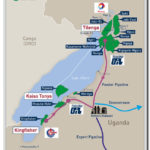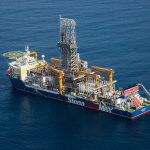“The Industry and People Need Radical Change to Ensure Energy Sustainability”- Dr. Abdul Halim

In this exclusive chat, Dr. Abdul Halim Abdul Latiff, Head, Centre for Subsurface Seismic Imaging (CSI) at University Technology PETRONAS in Malaysia. Offers best practice on the current oil price volatility, the best collaboration strategies to address skills shortage primarily in East Africa. And he offers insight on
on the type of soft skills set required by oil and gas employers.
Hussein Boffu brings excerpts
1.The oil industry has experienced many oil shocks, first during the financial crisis of 2008 to 2009, then during the oil prices crash of 2015/2016 and the latest is the oil price slump of 2020 due to COVID-19. What can companies and professionals and academia do to support energy transition?
The oil and gas industry has been through many cycles of peaks and lows for the past 50 years. In the last 10 years alone, several highs and lows were recorded, with the latest low emerge from the impact of novel coronavirus and oil price war between the oil majors. While it is a cycle that definitely will see the oil and gas industry emerge stronger, the industry and the people involved need a radical change and transformation to ensure the sustainability of the main source of energy.
From the academia and R&D perspective, the volatile oil and gas market can bring a positive impact on the development of the new technology in the hydrocarbon industry. With the low oil price, less focus and R&D will be generated from other source of energy, particularly renewable energy, which remain expensive. More consumers are now reliable to oil and gas production than ever, than it is high time for academia and R&D in the oil and gas industry to look for new hydrocarbon traps, play types, and increase the efficiency of the hydrocarbon recovery. With the low oil price is expected to last until 2021 – 2022, the oil and gas industry should change the way we operate. The digitalization, IR4.0 is now the main role in moving the industry towards the sustainable oil and gas industry.
2.What are the best collaboration strategies between regional universities with the oil and gas curriculum and their foreign counterpart to create world-class graduates versus local champions?
In the current globalization world, no one should ever work alone, let it be in the industry, government, or academia. With the era of Industrial Revolution 4.0 that currently being championed by the frontier industry, including oil and gas, academia around the world must be connected and work together to address the complexity of current issues and challenges. From the academic perspective, the global oil volatility has exerted the pressure within the universities to continuously supply top talents in the upstream and downstream business, to solve forever sophisticated problems faced in the industry.
In this regard, the universities must work together, sharing the expertise and complement each other technologies and solutions to provide a suitable workforce for the industry. Leading by example, Universiti Teknologi PETRONAS (UTP), a Malaysian university that focuses on the hydrocarbon industry, has established various network and partners around the world, notably from the similar niche universities such as Pertamina University (Indonesia) and French Institute of Petroleum (IFP, France), in building the better workforce for the oil and gas industry.
3..How to prepare our graduates, who are facing a rapidly changing job market characterized by advanced technology, to become world-class workers who can make a bigger contribution at work or add more value to their colleagues and organization?
With the “easy oil” era is over, locating and extracting hydrocarbon from the Earth becomes more complicated every day, as the target reservoir is shifted towards the complex overburden, remote/inaccessible region and deeper crustal layers. While the knowledge in geoscience and engineering fundamentals are still relevant, fresh graduates must also be equipped to advance computational and simulation model techniques. These skills are required to solve and search for more oil and gas reserve, that is not locatable through conventional development. In addition, the advancement of the digital world also requires major industry players to hire fully-converse digital geoscientists who capable in analyzing and evaluating the information in a holistic manner.
4..What are the essentials skills employers in the global oil and gas industry are looking for when they are trying to fill job positions?
The top three skills needed for any oil-and-gas company are complex problem-solving skills, critical thinking, and creativity. In addition, as we move towards Industrial Revolution 4.0, the university needs to put more emphasis on other soft skillsets such as collaboration (communication and teamwork), decision-making, and adaptation to technological changes. These skills are important to drive the industry towards the new era of oil and gas.”
To flourish – or even survive in this digital world – professionals should look beyond the traditional and conventional way of doing things, i.e. business as usual. The innovative application of technology in the industry, such as in mobile-based apps or online-based learning, has been proven successful in staying afloat in this industry.
Soon, I foresee that the oil and gas industry will change rapidly in terms of how exploration and production are being conducted. For example, the usage of Artificial Intelligence in conducting seismic survey and implementation of Machine/Deep Learning in seismic data processing and interpretation. This requires a high level of competency in digital knowledge; thus, professionals do not take a step forward, they will lag behind



